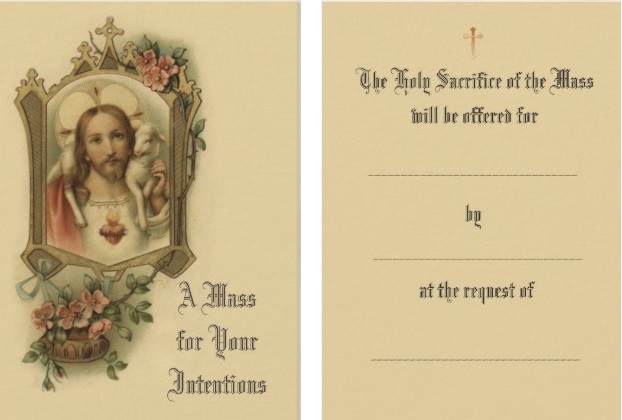|
Christ died
"once and for all" to expiate our sins. But this Offering is
re-presented to the Father at each and every Mass, and each
re-presentation has boundless -- literally infinite -- merit, a
merit that we can beg God to apply to the intentions of the faithful.
Pope Leo XIII,
in Mirae Caritatis, 1902, wrote:
[T]he grace of
mutual charity among the living, which derives from the Sacrament of
the Eucharist so great an increase of strength, is further extended by
virtue of the Sacrifice to all those who are numbered in the Communion
of Saints. For the Communion of Saints, as everyone knows, is nothing
but the mutual communication of help, expiation, prayers, blessings,
among all the faithful, who, whether they have already attained to the
heavenly country, or are detained in the purgatorial fire, or are yet
exiles here on earth, all enjoy the common franchise of that city
whereof Christ is the head, and the constitution is charity. For faith
teaches us, that although the venerable Sacrifice may be lawfully
offered to God alone, yet it may be celebrated in honour of the saints
reigning in heaven with God Who has crowned them, in order that we may
gain for ourselves their patronage. And it may also be offered - in
accordance with an apostolic tradition - for the purpose of expiating
the sins of those of the brethren who, having died in the Lord, have
not yet fully paid the penalty of their transgressions.
A Mass may be offered for the living or for the dead, and this has been the
practice since the Church's first days. St. Augustine, for example,
famously records in his "Confessions" some of the last words his mother
said to him. St. Monica told her son, "Lay this body anywhere, let not
the care for it trouble you at all. This only I ask, that you will
remember me at the Lord's altar, wherever you be."
Catholics remember their beloved at the Lord's altar by offering their
Masses -- their reception of Holy
Communion -- for someone's specific intentions, such
as thanksgiving, conversion, physical healing, to honor that person on
a special day, the releasing of souls from
Purgatory, etc. They do this by simple prayer before or after Mass,
such as "I offer this Mass for the benefit of my sick
friend."
And Catholics more formally ask a priest to offer Mass for their cause.
These more formal offerings are called "Mass intentions."
About Mass
Intentions
A Catholic
may ask any priest to offer Mass for a certain intention, whether or
not the priest is personally known to him, whether or not the person is
able to attend that specific Mass. When requesting this, money plays no
inherent role. No one can ever "buy a Mass." But it is customary to
offer what's called a "stipend," a small amount recommended by a
priest's Bishop. As I write, the typical stipend amount is $10. A
Catholic can offer as much as he likes, however, but no money is required to ask that a Mass be said
for a specific intention.
Because the merits of the Mass are infinite, any number of intentions
may be made in a given Mass, but a priest can only receive one stipend
per day, no matter how many Masses he offers that day (though note that
priests usually offer a single Mass a day, with some expections, such
as on Christmas, on All Souls Day, where there is a shortage of
priests, etc.). This is to remove even any appearance of simony.
Often, but not always, when a Mass is offered for a specific intention,
notice is made of that fact in parish or chapel bulletins.
How to
Make a Mass Intention
You can simply ask your priest in person or by phone to offer a Mass
for your cause, or you can put your stipend along with a note detailing
your intention into an envelope and drop it in the offering basket at
Mass. Parishes, chapels, chanceries, and religious orders sometimes
offer specially marked envelopes for this purpose.
When a Mass is offered, it's customary -- depending on the intention --
to send Mass cards to those who'd be comforted by knowing that such a
Mass is being offered. For ex., when a friend is sick and a Mass is
arranged for his benefit, sending that friend a Mass card letting him
know that a Mass is being offered for him is more powerfully comforting
than flowers. Such Mass cards can sometimes be found in parish offices
and in chanceries, or can be purchased from religious orders or
priestly fraternities, from Catholic stationers, or from places like
E-bay or Zazzle online.

A sample
Mass intention card, outside and inside
See also the pages on Votive Offerings
and Spiritual Bouquets. |
|

